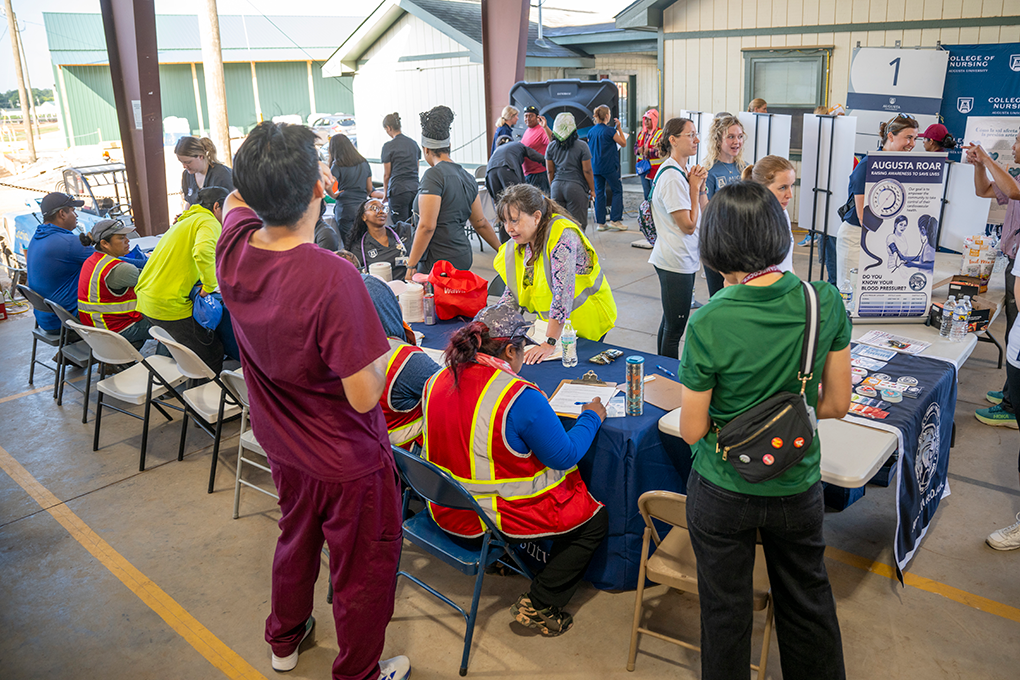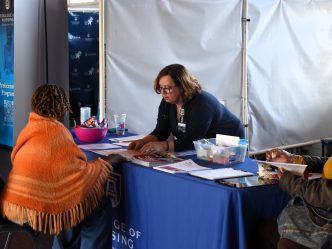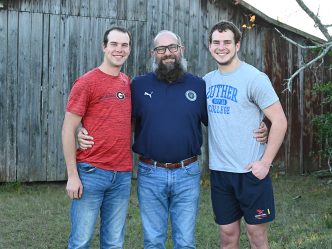When it comes to meeting people where they are, Debbie Layman may have written the book on the subject.
Thanks in large part to the generosity of Layman’s family, seasonal farmworkers with little to no access to viable health care have had a day dedicated to their wellness delivered straight to them for the past 20 years – on the job, right by the fields they work each day in Trenton, South Carolina.
Supplying health care providers to meet that critical need for a vulnerable population through the annual Costa Layman Health Fair has been mutually beneficial for Augusta University. The real-world, rural health care experience AU students gain at Costa Layman can serve them long after they leave the university.
The annual health fair has grown from simple beginnings, thanks to the faculty, staff and students in AU’s College of Nursing. This year, the interdisciplinary effort included representatives from the College of Allied Health Sciences, Dental College of Georgia at Augusta University, Georgia Cancer Center, Medical College of Georgia at Augusta University, College of Science and Mathematics, the ROAR initiative through The Graduate School at AU and AU’s University Libraries, as well as the Ryan White Program, Georgia Prevention Institute and AU’s Office of Critical Event Preparedness and Response team. Wellstar MCG Health also sends teams from Laboratory Services and Interpreter Services.
The list of AU colleges and organizations participating is a point of pride for Layman, who appreciates the university’s long-standing commitment to the health fair. Having many of the same providers, educators and volunteers attending year after year gives a sense of familiarity to the farmworkers.
“Costa Layman started with the College of Nursing and is now a multidisciplinary event for AU,” said AU President Russell T. Keen. “It provides training for our students outside the clinical setting they wouldn’t receive otherwise. It’s an engagement opportunity every single year our students are able to have that also serves one of the greatest needs in our region. The partnership has helped more than 7,000 farmworkers over the years.”
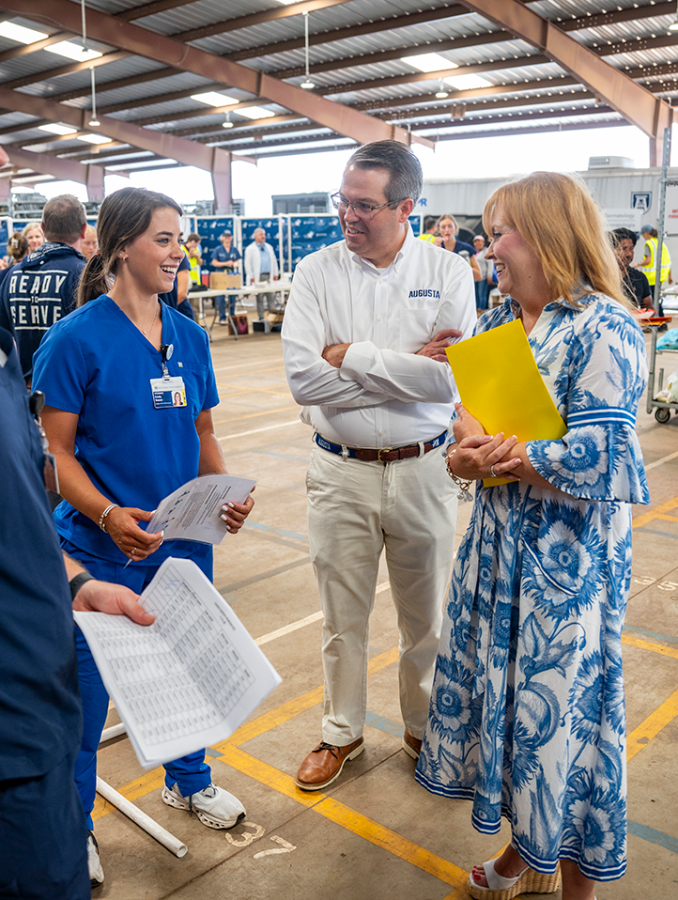
Deep roots
As the Costa Layman Health Fair celebrated its 20th anniversary this summer, Layman recalled its modest beginnings. Back in 2006, the dean of nursing reached out to Layman, an alumna, and asked if her family’s business, Layman Nurseries, would be open to providing the clinical site for a course called Spanish for Medical Caregivers.
“It just seemed like a natural fit for both of us. They were going to bring students who could practice their medical Spanish skills and provide care, and they delivered great care to our workers at the nursery,” said Layman, who is also a past president of the AU Foundation. “We valued our employees and wanted them to be healthy.”
She was pleased with that initial partnership and knew right away she wanted to continue to build on it, though she never dreamed it would become the operation it is today.
There was some expected hesitancy from the farmworkers at that first gathering, with its small offering of general health screenings. But, as trust was solidified over the years, the employees have become eager participants. Even after the family sold Layman Nurseries to Costa Farms in 2012, Layman and her family saw to it that this life-changing annual tradition would continue under the new ownership.
“We want you to be able to live a long lifetime. You take care of your families, and this is something we can do for you,” Layman explained to the Layman Nursery employees. “This information is all your personal information, and it is not shared with anybody other than you. This has grown from basic screenings to comprehensive wellness brought to the farm, done on a loading dock in Trenton, South Carolina.”
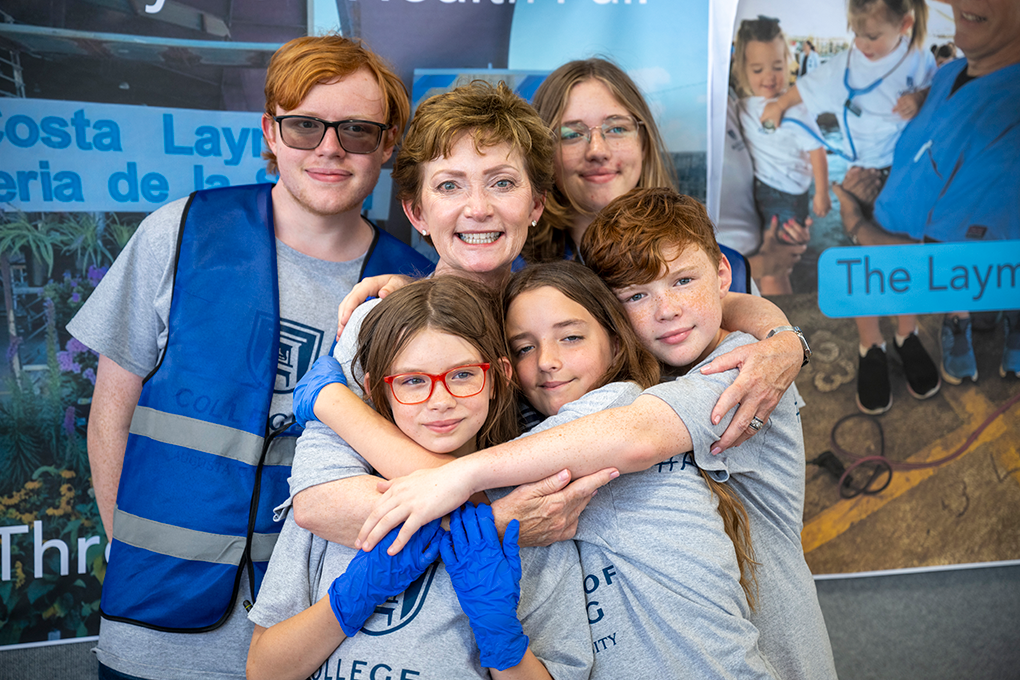
The health fair’s expansion from a farm maintenance shed to a massive loading dock is a passion project for Layman alongside Pam Cromer, DNP, a professor in the College of Nursing and director of the Interdisciplinary Costa Layman Community Health Outreach Programs. They work tirelessly throughout the year to prepare for this event that requires months of planning and dozens of day-of volunteers, including students, faculty and staff. From coordinating with CEPaR on meticulously thorough setups, organization and safety plans, to collaborating across multiple colleges to ensure the most comprehensive screenings, no detail passes this duo.
Reflecting on her partnership with Layman, Cromer’s perspective on the health fair has evolved over time. What began as a logistical partnership soon became a deeply personal mission.
“I realized that just because she owned the nursery and allowed us to come out there, her heart was deeper than that. She was really, very interested in making sure those workers got health care and that they stayed healthy,” said Cromer of her longtime friend. “Not only was she advocating for those workers because of her nursing background, she kept pushing me to do more and to grow it bigger to make sure that nursing realized their importance in this particular project.”
On the farm
Rebecca Tesch, who was a nurse for many years before returning to graduate school to become a nurse practitioner, was back for a second year of volunteering at Costa Layman this year.
“I’m really grateful to be a part of this. I think it’s a great way to give back to the community,” said Tesch.
As she worked with an endocrinologist and a high school volunteer, Tesch said it’s helpful to see what other providers do and practice working together to achieve a common health goal.
“I’m just proud we’re able to make an impact.”
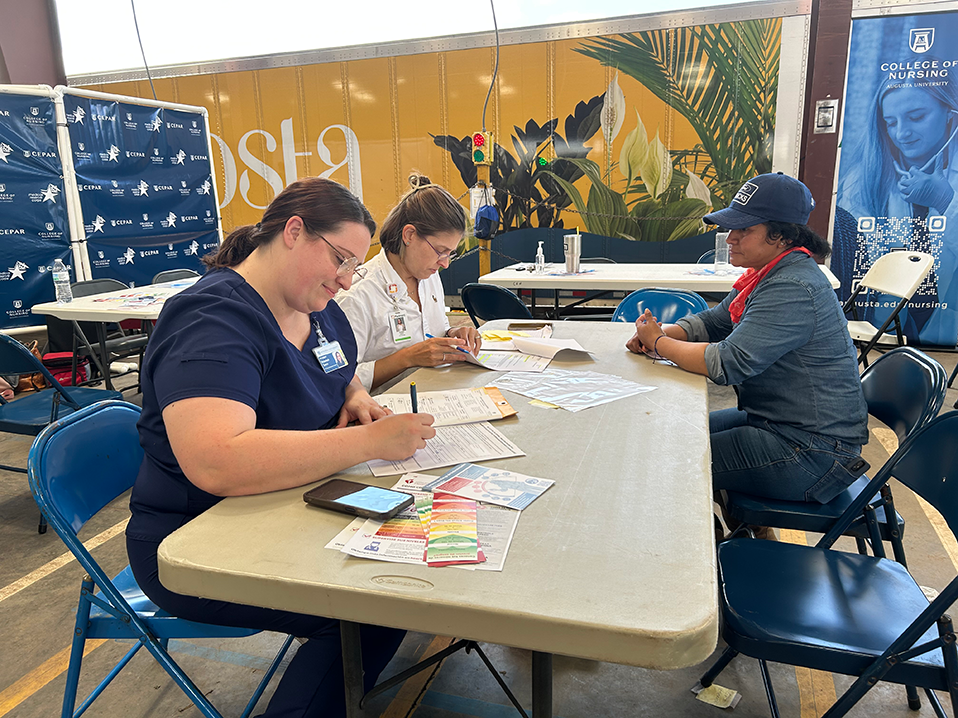
More than 200 farmworkers moved through the various stations this year. Leadership from AU’s ROAR Initiative, a National Institutes of Health-funded research center at Augusta University, focused on cardiovascular health with volunteers measuring blood pressure and sharing vital information about hypertension as part of the project’s educational and community outreach component.
In the same corner, a group from the Georgia Prevention Institute also zeroed in on blood pressure readings.
Fifty-one bilingual interpreters from Wellstar MCG Health’s Interpreter Services wore yellow vests to stand out in the crowd and were on hand to help translate and explain any information or problems. Their service allows the farmworkers to receive valuable information in their native language.
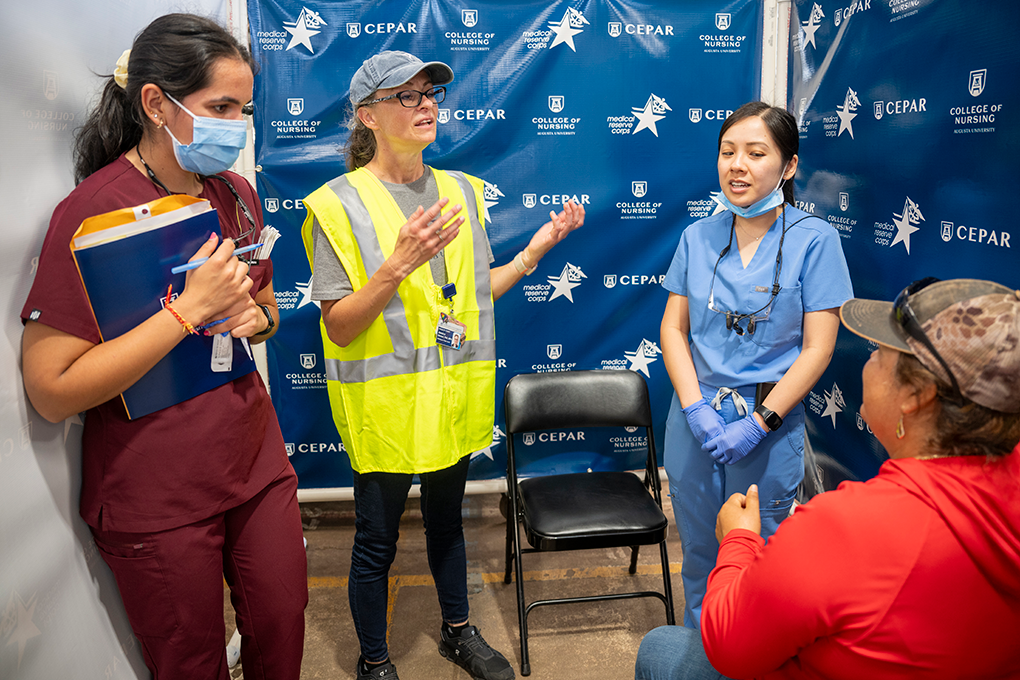
Wellstar MCG Health set up a mobile lab to conduct bloodwork for any farmworkers who didn’t have a chance to attend the lab day held prior to the health fair. For 2025, the fair added privacy screens provided by CEPaR to enhance the comfort of those having their blood drawn and mobile units for screenings like an EKG, so patients would have the same private space they’d find in a traditional medical setting.
A host of students and volunteers from the Dental College of Georgia performed dental screenings on-site and made any necessary referrals. Dental screenings at Costa Layman typically account for the greatest need for follow-up care.
There were also skin cancer screenings, hearing and vision tests and representatives at the health fair to meet various respiratory, occupational and physical therapy needs.
Pre-medical students from the College of Science and Mathematics contributed by supporting various booths, including serving as interpreters. Their participation aligns with curricular requirements to engage in community service, making this event a meaningful opportunity for experiential learning.
Working alongside interdisciplinary teams and community organizations on-site, students gained valuable insight into collaborative health care delivery. Many have returned for additional outreach opportunities sponsored by the College of Nursing and have expressed appreciation for the chance to observe and engage with diverse health care professionals. These experiences foster a deeper understanding of interprofessional teamwork — an essential component of effective patient care across all settings.
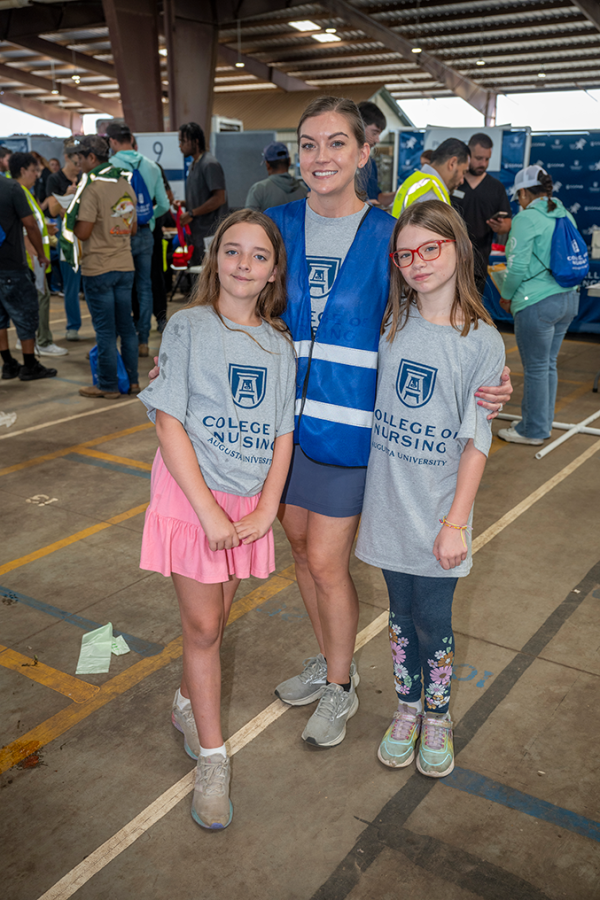
Family affair
Allison Layman remembers attending her first Costa Layman Health Fair after hearing about it before she and her husband, Barrett, married. She’s been involved ever since, whether acting as a sounding board for her mother-in-law Debbie, or brainstorming ways to improve from the previous year’s event or helping with the flow of operations alongside her family.
This year, Allison and Barrett’s 10-year-old twin daughters manned a food station next to their three cousins, the children of Christina Layman Holmes. Alex Layman, a rising fifth grader, proudly practiced her Spanish as she helped distribute fresh fruit and cold water to workers and handed them extra produce bags filled with healthy foods to take home.
“The thing that I like the most about this event is how holistic it is. They’re really trying to take care of the whole person, and getting these screenings done is just so valuable,” said Allison, who proudly shared the family’s excitement for the 20th anniversary. “We’re just so proud of Debbie. To be able to pull this together even once would have been amazing, but the fact that she’s done it 20 times is incredible.”
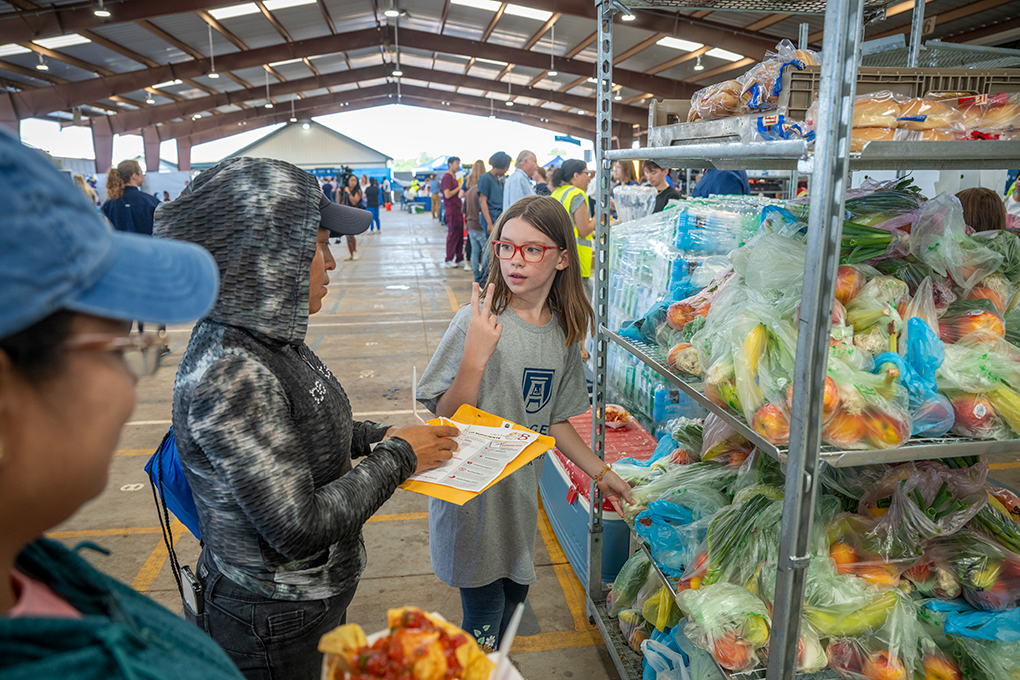
A win-win
Cromer says Costa Layman’s benefits extend beyond the farm and Augusta University to the health care system at large. Preventive care on such a grand scale directly impacts the number of uninsured people seeking emergency care, lessening the burden on local hospitals.
“We can provide all of the services that you would expect at a health fair. That impact has probably saved each family about $1,000 over the last 10 years. That is each farmworker’s family,” explained Cromer. “And it has actually reduced the number of emergency room visits to the area and probably saved the health systems around $1 million during that same time period.”
As the chapter closes on the much-anticipated 20th anniversary of Costa Layman, university stakeholders can’t help but look back on its rich history with gratitude and to the future with expectation.
“I felt an immense pride at seeing everyone’s hard work and planning come to fruition. For 20 years, the health fair has been a shining example of Augusta University’s interdisciplinary collaboration. The College of Nursing continues to demonstrate the importance of teamwork and how that can bolster the efforts of community engagement initiatives,” said Beth NeSmith, PhD, dean of the College of Nursing. “When we extend our expertise to some of those who care for others through their own work and often have the most difficult time accessing care for themselves, the impact from that creates a positive ripple throughout the entire community. The blood work, the screenings, the access to health information — these are resources that would otherwise not be available to these workers. It’s an honor to be able to provide them with an annual opportunity to take control of their health and continued well-being.”
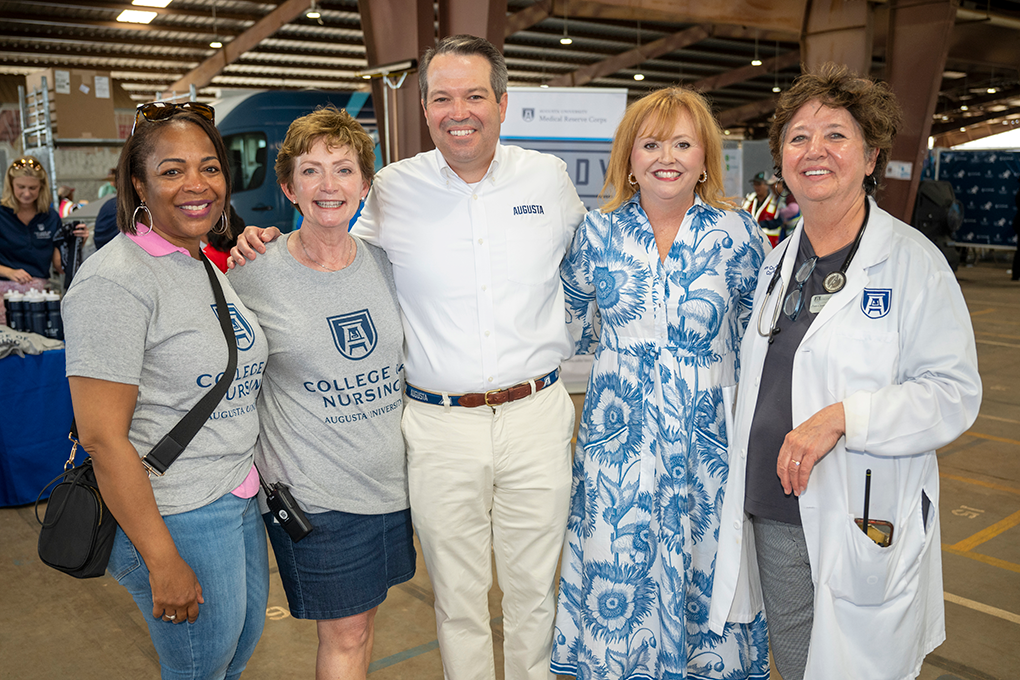
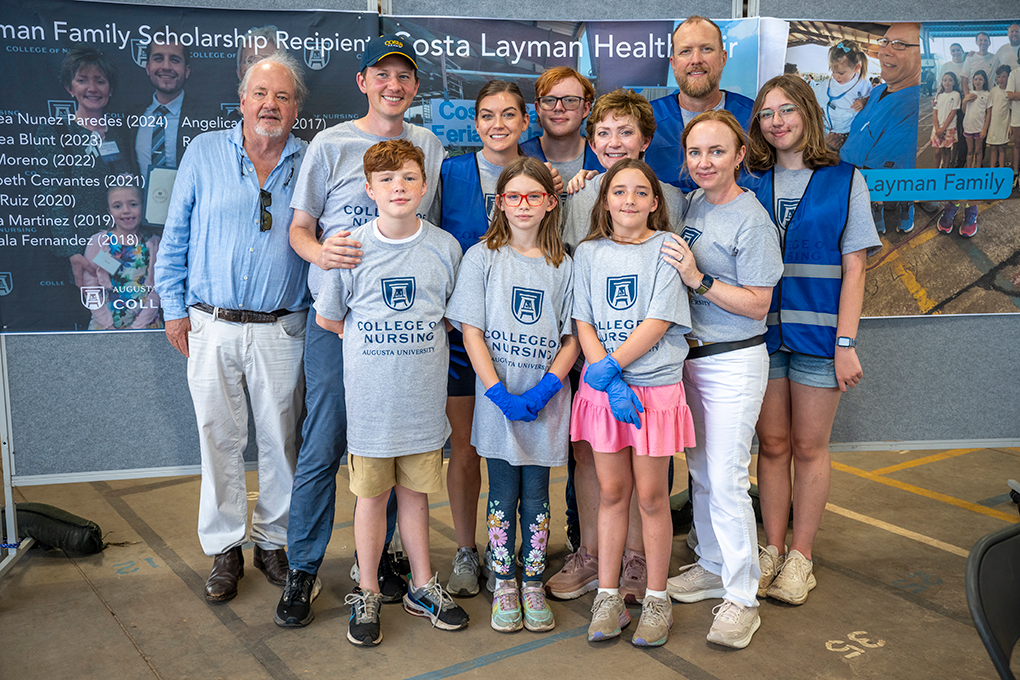
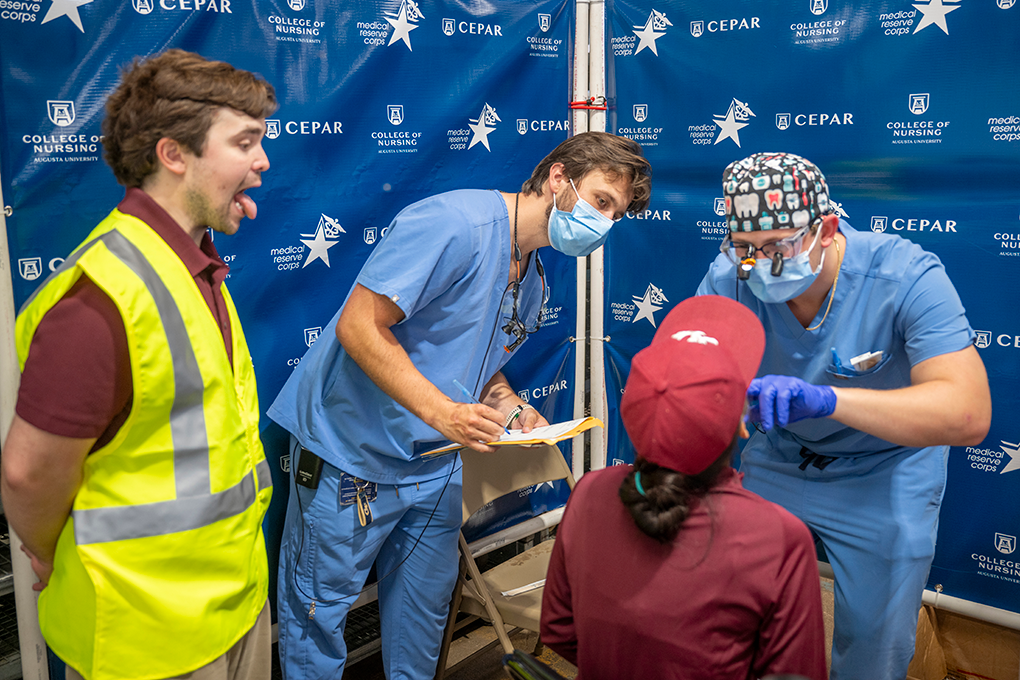
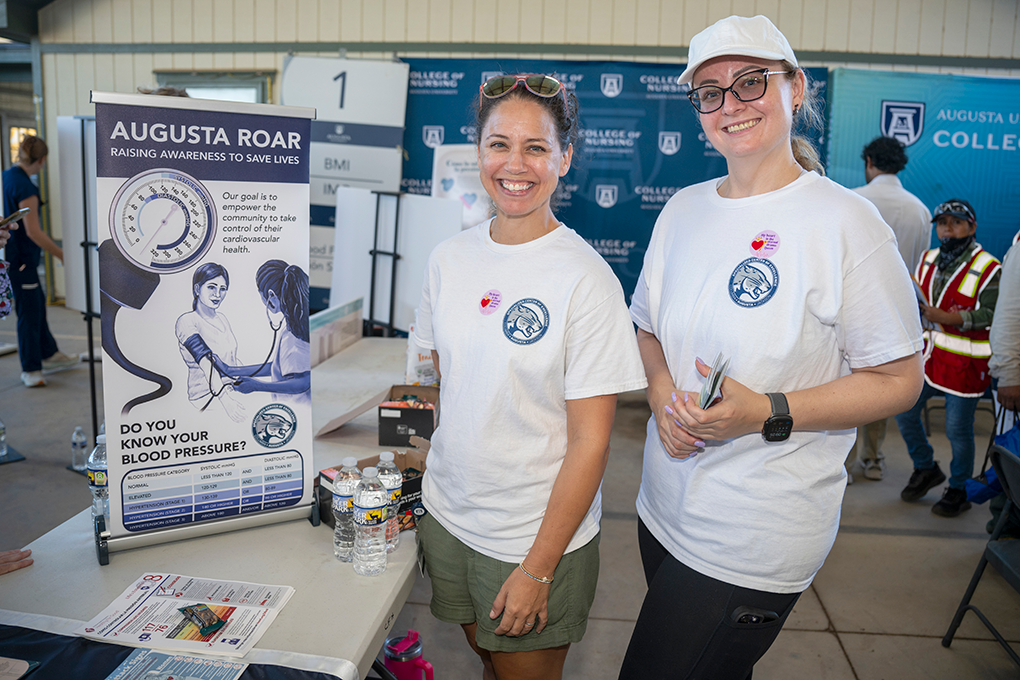
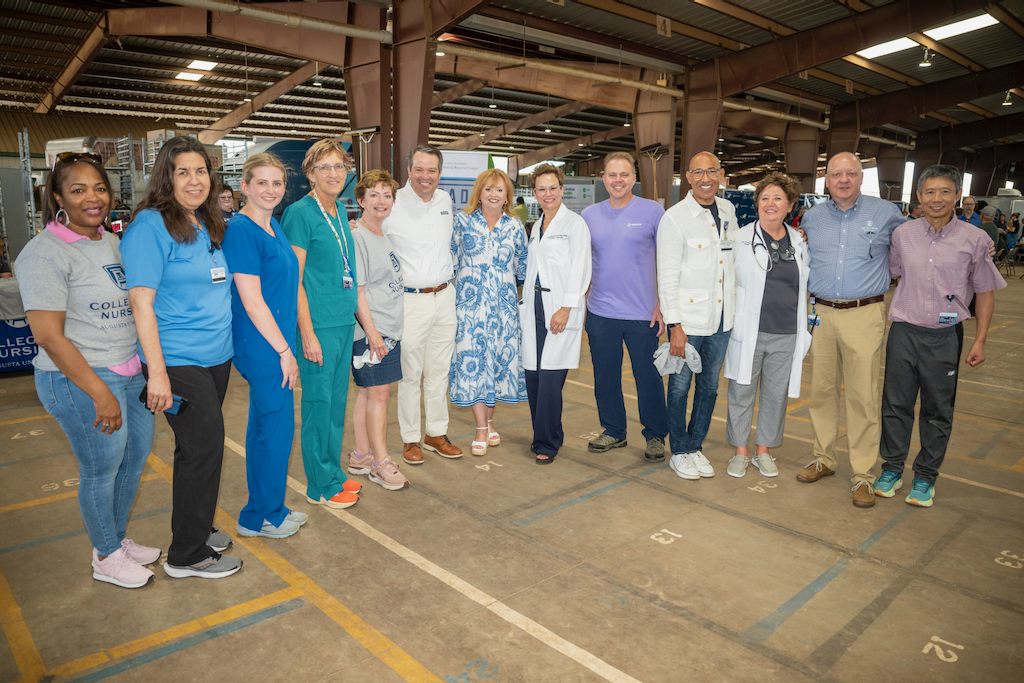
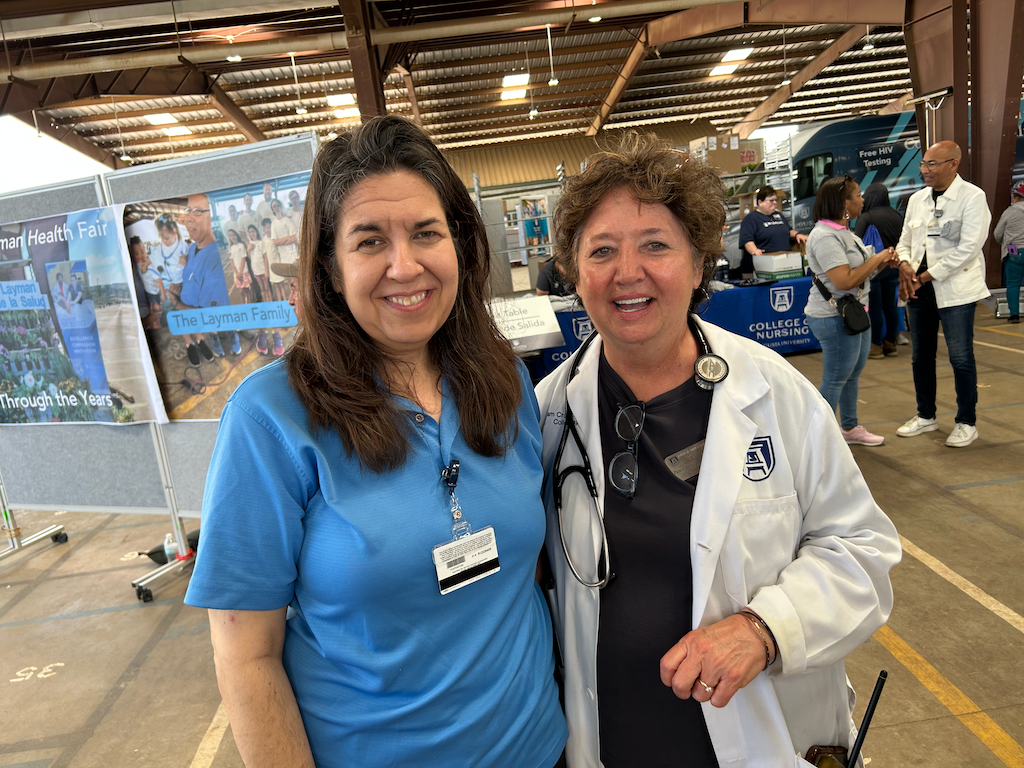
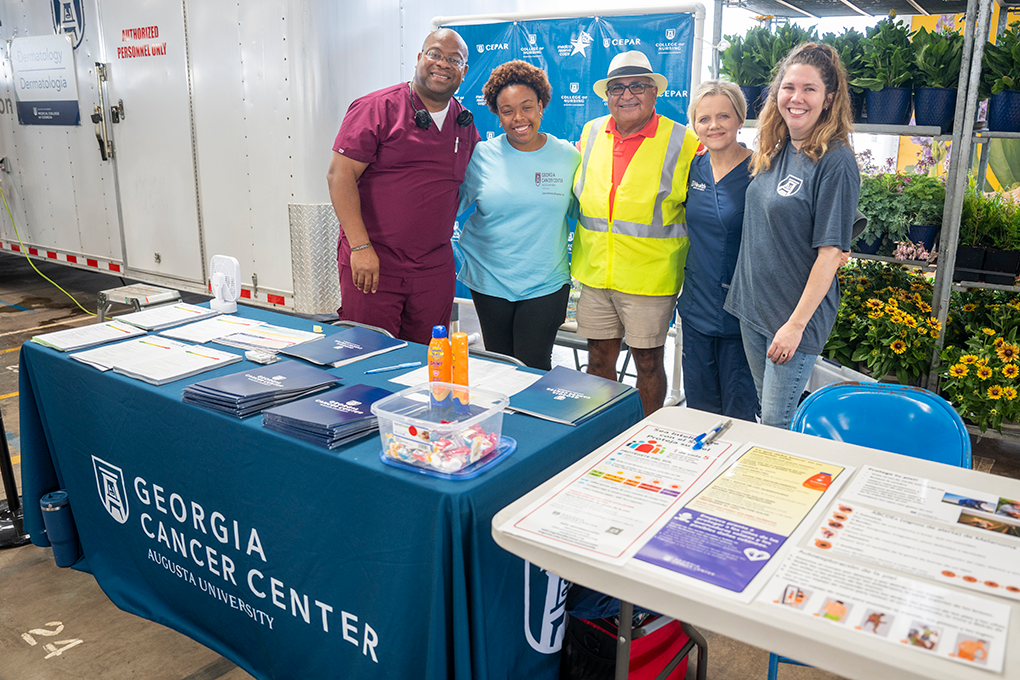
 Augusta University
Augusta University
